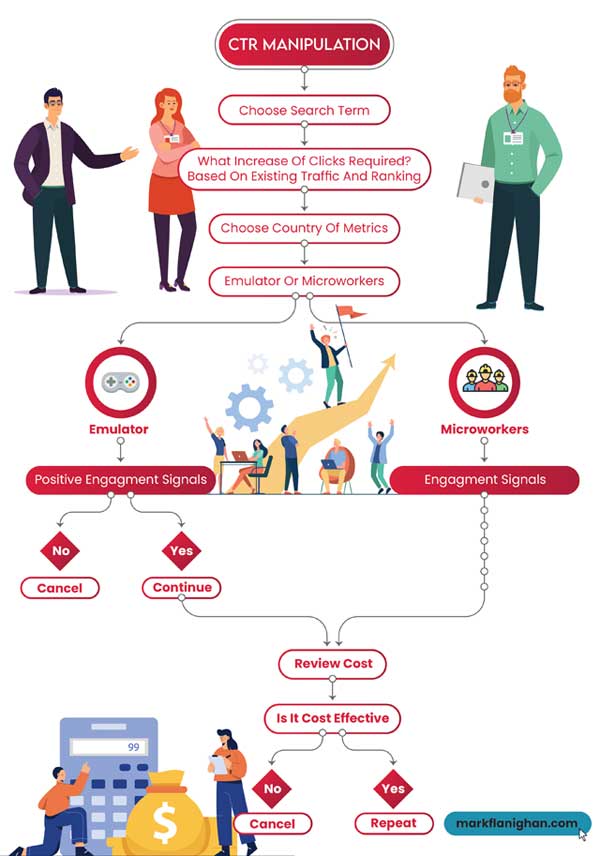Exploring the Relationship Between CTR Control Solutions and User Actions
In the world of electronic advertising, the impact of click-through rate (CTR) manipulation solutions on user behavior continues to be a complicated and appealing subject. As online platforms increasingly count on CTR metrics to determine the success of content, items, and services, recognizing exactly how these controlled prices impact customer interaction and decision-making procedures is extremely important. The interplay between CTR adjustment and customer behavior questions regarding authenticity, reliability, and the ethical implications of such techniques. By exploring the complex partnership between CTR control solutions and customer actions, intriguing understandings emerge that might reshape our understanding of electronic marketing techniques and their effects on consumers.
Influence of CTR Manipulation on Behavior
Examining the impact of Click-Through Price (CTR) manipulation on individual actions reveals critical insights right into the characteristics of online engagement. CTR control includes unnaturally blowing up the number of click a certain web link or advertisement to trick customers and search engines. This practice can result in a distorted assumption of a webpage's popularity or relevance, eventually influencing customer actions.

In addition, CTR control can alter the information utilized by algorithms to personalize user experiences. This can result in users being served content that does not align with their preferences or interests, ultimately leading to a decline in individual satisfaction and engagement. Recognizing the influence of CTR adjustment on individual habits is vital for maintaining openness and count on on the internet interactions.
User Involvement With Adjusted CTR
Individual engagement with adjusted CTR information commonly causes skewed perceptions of on-line web content popularity and importance. When individuals interact with web content based on artificially filled with air Click-Through Rates (CTR), they may think that specific information, items, or solutions are much more popular or reliable than they really are. This can result in customers making choices based on misleading information, resulting in possibly undesirable outcomes.
Involvement metrics like likes, shares, comments, and time invested on a web page are frequently affected by CTR control. Users might be much more inclined to involve with material that appears to have greater interaction prices, even more bolstering the cycle of skewed understandings. Consequently, web content developers and marketers may focus on generating material that produces high CTR instead of concentrating on creating really valuable and appropriate product.

Psychological Results of CTR Control

Moreover, the psychological results of CTR control can also manifest in transformed decision-making processes. Users may be extra likely to click on content only based upon its viewed appeal, as opposed to its real worth or relevance to their needs. This behavior change can cause a shallow engagement with on the internet web content, where individuals might neglect top notch but much less popular offerings in support of those with synthetically boosted CTRs.
Essentially, the psychological implications of CTR adjustment highlight the significance of keeping transparency and credibility in online interactions to promote real user engagement and depend on.
Moral Considerations in CTR Manipulation
Considering the honest effects of manipulating click-through rates (CTR) in on-line platforms is important for keeping integrity and depend on within the electronic community. CTR adjustment raises issues concerning tricking customers, distorting data analytics, and jeopardizing the trustworthiness of on-line content. One significant moral factor to consider is the prospective influence on user freedom and decision-making. By synthetically pumping up CTR, users may be misguided right into clicking links or ads they would certainly not have picked or else, resulting in a disingenuous online experience. CTR adjustment can alter the efficiency metrics that businesses depend on to make tactical decisions, inevitably influencing market competitors and customer trust fund.
Another ethical aspect to consider is the fairness of manipulating CTR to get an unfair benefit over competitors. Taking part in such techniques not just breaks principles of justice however also weakens the trust fund that individuals put in online systems. It is necessary for companies and electronic marketing professionals to support moral criteria in their methods to guarantee openness, reputation, and long-lasting sustainability in the on-line atmosphere.
Implications for Digital Advertising
With the increasing dependence on digital platforms for advertising and marketing functions, the technique of manipulating click-through prices (CTR) poses considerable effects for the effectiveness and honesty of electronic marketing methods. CTR adjustment can result in manipulated data analytics, misleading marketing professionals into thinking that their projects are performing much better than they really are. This can lead to misallocation of sources, with companies buying underperforming strategies based on falsified CTRs. When customers recognize that CTRs have actually been manipulated, it can wear down trust fund in the brand, leading to long-lasting adverse effects for customer commitment and brand credibility.
Additionally, the use of CTR manipulation solutions can develop an unfair competitive landscape, where companies that take part in such techniques gain an artificial benefit over those that abide by honest advertising standards. This can stifle advancement and imagination in digital advertising, as success comes to be even more about adjustment strategies than supplying genuine worth to consumers. Ultimately, the ramifications of CTR adjustment for electronic advertising and marketing extend beyond short-term gains, impacting the overall sustainability and integrity of advertising initiatives in the electronic realm.
Final Thought
In verdict, the connection in between CTR control services and individual actions is intricate and diverse. The impact of CTR adjustment on actions, customer involvement with controlled CTR, mental effects, moral factors to consider, and implications for electronic advertising all contribute in shaping this partnership. Comprehending these characteristics is vital for marketing professionals and researchers alike in order to navigate the honest effects and optimize the effectiveness of their electronic marketing approaches.